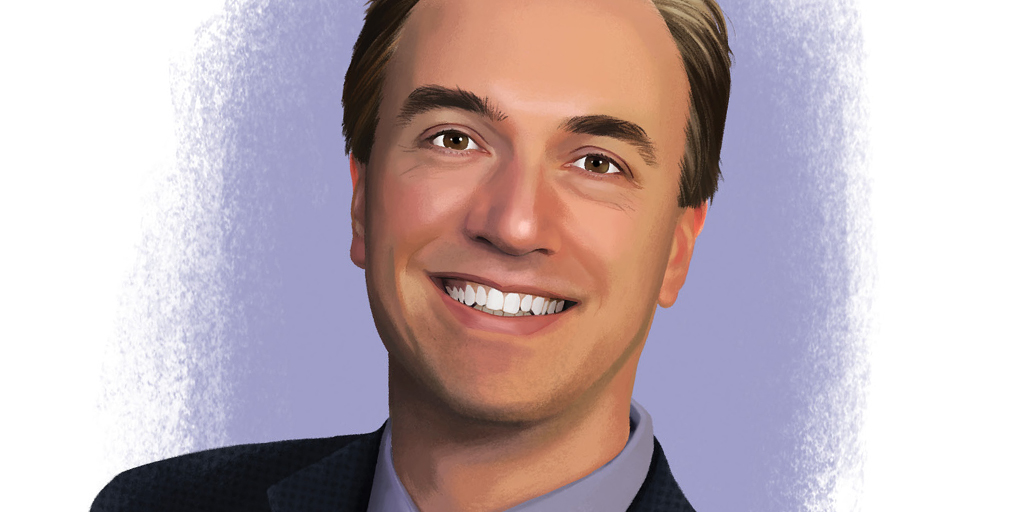
Throughout his tenure on the Actuarial Board for Counseling and Discipline—including one year as chairperson—William C. Hines has offered measured, thoughtful leadership. As he continues his term as chairperson, Hines reflects on guiding the profession through ethical complexity, expanding the use of requests for guidance, and preparing for challenges ahead.

With a career spanning financial reporting, regulatory accounting, and international actuarial leadership, William C. Hines, MAAA, FSA, Actuarial Board for Counseling and Discipline (ABCD) chairperson, brings a broad and nuanced perspective to actuarial professionalism. A principal and consulting actuary in Milliman’s Chicago office, Hines has advised life insurers across the United States, Bermuda, and the Cayman Islands.
Hines has served on many Academy volunteer committees, councils, and task forces, including the Financial Reporting Committee and Risk Management and Financial Reporting Council, the Financial Regulatory Task Force, and International Accounting Standards Task Force, all of which he chaired. He also was a member of the Council on Professionalism and Education, the Nominating Committee, and the Life Financial Soundness/Risk Management Committee.
Since joining the ABCD in 2021, Hines has applied that depth of experience to one of the profession’s most critical functions: self-regulation. As he continues his two-year term as ABCD chairperson, Contingencies caught up with Hines about what he’s learned, the importance of requests for guidance (RFGs), and the challenges and opportunities he sees on the horizon—from artificial intelligence (AI) to climate change.
Since joining the ABCD in 2021 and now concluding your fifth year of service, what has surprised you most about ABCD’s work and its role in the actuarial profession?
I have been pleasantly surprised by the number of RFGs that we continue to receive. More and more actuaries are becoming aware of this resource, and I see it as really helping them with their work. I would love to see more people take advantage of this resource.
At the other end of the spectrum, I have also been surprised by the number of situations where a complaint might be warranted, but the complainant is blocked from doing so because of confidentiality. This is something I worry about when it comes to the profession—that poor work is not coming to light because of these constraints. I fear that one day, when such work will be disclosed, the profession will be questioned as to why it did not do anything about it.
How has serving on the ABCD shaped your own perspective on professionalism and ethical
decision-making?
I think my time on the ABCD has helped me appreciate the need for clear disclosure and transparency in what we do as actuaries. A number of issues I have seen come up through the RFG or complaint process involve the need for further documentation or the lack of documentation of certain items such as the intended use of the work product, who is responsible for the underlying assumptions, and even who authored the work. I have come to appreciate how well the Code of Professional Conduct and the actuarial standards of practice (ASOPs) address these issues, and I have applied those learnings in my own work products, and in the advice I give to colleagues and during RFG discussions.
What qualities make someone well-suited to serve on the ABCD?
There are a number of qualities that I think are useful in an ABCD member, chief of which is a real interest in seeing the profession thrive. A lot of ABCD members mention that they expressed interest in becoming members because they want to give back to the profession. Other qualities such as being a good listener and not making assumptions about a person’s motivations are also very important. Whether it is an RFG or reviewing a complaint it is important to keep an open mind and ask questions about the perspectives of the actuaries involved. Very often we find information that had not been previously brought to light and that can change how you might view the situation at hand.
What have you learned from your fellow ABCD members over the years?
We have had a great group of members during my time on the ABCD. Some of them I knew prior to joining the ABCD, but many others have been new to me. Each of them brings a wealth of experience. I am always learning new things.
My professional experience has been in the life and annuity practice area, which involves primarily long-duration products. And while I have spent many years working on cross-practice issues through my volunteer work at the Academy and the International Actuarial Association, I have learned a lot through my ABCD colleagues about the issues involved in short-duration products and the regulation of those products. Being able to appreciate the differences from my own experience and the different pressures that actuaries in such markets might face has helped me during our deliberations of issues, responding to RFGs, and in giving presentations and webinars I’ve participated on professionalism issues.
The Code of Professional Conduct, the U.S. Qualification Standards, and the actuarial standards of practice are essential elements of the actuarial profession’s framework for self-regulation. Are these standards enough? How do you view the ABCD playing a role as part of self-regulation?
I believe that the Code, the U.S. Qualification Standards (USQS), and the ASOPs are the key foundation to our profession’s self-regulation. But it is one thing to have these requirements and it is another to hold ourselves accountable for meeting them. The ABCD is the key tool of our profession in meeting those requirements. We need to hold each other accountable in order to meet our duty to the public and to safeguard the profession.
The ABCD’s ability to investigate complaints involving members of any of the five U.S.-based membership organizations—as well as Canadian and Mexican actuaries working in the U.S.—is the most effective process. Because ABCD members come from different practice areas and have different experiences, this allows for a fuller discussion and a thorough consideration of each issue with which we are presented. Having the ABCD serve the role as the investigatory body independent from the membership organizations makes the complaint review process fair and balanced.
In your view, does the ABCD provide a credible disciplinary process that’s essential to maintaining the public’s trust and the right of the actuarial profession to remain a self-regulated one?
Yes, the ABCD does provide a critical component of a credible disciplinary process that is essential to maintaining the public’s trust and our profession’s independence. If the ABCD did not exist, the functions we perform would still need to be done by the membership organizations when they receive a complaint. With the ABCD you get a consistent process for each complaint that is independent from the membership organizations. Because U.S. actuaries tend to be members of more than one actuarial membership organization, you get a more efficient process. The membership organizations are not beholden to ABCD’s recommendations. They are free to conduct further inquiries and determine a course of action on their own. Still, the ABCD cannot do it alone. It is the responsibility of all actuaries to hold one another accountable. While the ABCD does initiate some complaints when we are made aware of information in the public domain, the vast majority of complaints come from individuals. If we are to really fulfill our mission to the public and maintain our self-regulation, we need to do more than say we have standards. We must live up to them, and that includes calling out work or conduct that does not meet our standards.
Are there any misconceptions among actuaries about the ABCD’s role or purpose?
The most common misconception I have found is that some actuaries believe that the ABCD imposes discipline on actuaries. This is not true. Only the membership organizations can impose discipline. Besides answering requests for guidance, the ABCD’s role is to investigate complaints and to recommend a course of action to the membership organizations. It is up to them to decide whether to accept that recommendation or do something different.

For the first few years of the ABCD, there were fewer than 10 requests for guidance handled each year. This number increased over time to 2016, when the ABCD first handled over 100 RFGs in one year. Since 2016, the ABCD has consistently handled 100-plus RFGs. Why is that? And how important is this service to both new and experienced actuaries?
I believe the increase is mostly due to awareness of the RFG process. The ABCD has worked hard to highlight this resource through presentations, articles, and webinars. While I have seen mostly experienced actuaries use this resource, I find that we can be quite helpful to people who are relatively new to the profession. I also think actuaries who are in smaller companies or are solo practitioners may benefit greatly as they often don’t have many colleagues with whom they can have such conversations.
Are there any trends in the types of RFGs or complaints that the ABCD is seeing today?
Over the last 18 months or so, we have seen a wide variety of topics covered in RFGs. Approximately 30% relate to the USQS, another 12% involve Precept 13 of the Code, another 12% relate to dealing with other actuaries, regulators, or principals, and 10% relate to interpretations of various ASOPs. The remaining inquiries are spread across a wide range of topics.
ABCD members say that handling RFGs is one of the more enjoyable duties. Why is that?
RFGs can be quite rewarding because we are helping people. My experience—and that of others on the board—has been that at the end of the RFG conversation the actuary making the inquiry is better prepared to tackle the issue they are facing and that feels good. They appreciate the time we spend and the guidance we provide. It is not adversarial in any way. It is collaborative. And that makes the experience enjoyable.
As you enter your last year in 2026 on the ABCD, what are some key issues you see on the horizon?
Two things I see as being challenges for the profession and, thus for the ABCD, are artificial intelligence and climate change. The need for actuaries in financial security programs will continue to be strong, but the role actuaries serve and the focus of their work will likely change. Artificial intelligence is both seen as a threat and an opportunity. I tend to see it more as an opportunity. Just like personal computers didn’t replace actuaries in the 20th century, I don’t believe AI will replace us now. It will change how we do our work, like in all industries, and it will be a challenge to understand how best to develop, validate, and utilize AI resources. That will challenge the ABCD in ways we have not yet contemplated.
Similarly, climate change will refocus much of what we have done in the past regarding predicting claims or even developing insurance and other financial security products. Again, this will be a challenge to the ABCD as those changes occur.
However, I feel that the Code of Conduct, the USQS, and the ASOPs that the ASB has and will develop serve as a fundamental framework for how we approach both of these areas and will serve the ABCD as well.
What do you want actuaries to know about the ABCD?
That we are a resource to help them do good work. Through the RFG process, an ABCD member can help you work through the relevant provisions of the Code, USQS, and ASOPs with the goal of producing good actuarial work products. Even when considering a complaint, the goal is to identify where issues have arisen and get an individual to understand how the work should have been done.
If you could change or improve one thing about how the profession approaches professionalism, what would it be?
I would like to see the continuing education requirement of 3.0 hours per year on professionalism topics increased. I think more attention to what is really in the Code, the USQS, and the ASOPs will benefit many actuaries and may ultimately increase the number of RFGs we see, which I would welcome.